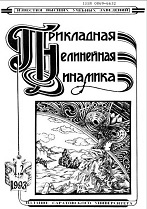|
HISTORY OF NONLINEAR DYNAMICS. PERSONALIA
Legacy of Alexander Mikhailovich Lyapunov and nonlinear dynamics
R. R. Mukhin
Branch of The Moscow State Institute of Steel and Alloys Starooskol'skii Technological Institute
Abstract:
Aim. The aim of the work is to study the scientific heritage of A.M. Lyapunov from the standpoint of nonlinear physics. Fundamental importance Lyapunov’s contribution is determined not only by the methods he created, which became the basis of the mathematical apparatus in the study of nonlinear phenomena, but his ideas and concepts introduced by him contributed to the formation of concepts and principles of nonlinear dynamics. Method. The study is based on an analysis of Lyapunov’s original works with the involvement of existing literature on his scientific heritage. Results. Lyapunov’s creativity is closely intertwined with the works of A. Poincaré, among many other fundamental achievements of which the qualitative theory that formed the conceptual basis of nonlinear dynamics is of particular importance. Lyapunov was the closest successor to Poincaré in the field of qualitative theory. Qualitative in its essence is the Lyapunov stability theory, one of the greatest achievements of mathematics of the XIX century. From these positions Lyapunov approaches the very formulation of the stability problem, singling out the unperturbed and disturbed motion. He developed methods for solving stability problems by proposing and rigorously justifying specific algorithms. One of the most difficult problems of mathematics and mechanics for several centuries is the problem of the equilibrium figures of a rotating liquid. It has numerous applications, stimulated the emergence of new ideas and whole research directions. To solving the problem of the figures of equilibrium, Lyapunov together with Poincaré made a decisive contribution. Lyapunov studied in detail and quite rigorously a series of new equilibrium figures, their bifurcations and stability. At the same time he created new analytical methods of research, in particular, the works of Lyapunov and Poincaré gave a powerful impetus to the development of the theory of nonlinear integral equations. An important general scientific value is the further development of Lyapunov’s results. The Lyapunov exponents have become fundamental for nonlinear dynamics. Their use is based on the multiplicative ergodic theorem. The Lyapunov exponents are related to another most important quantity, also a measure of randomness and instability – the Kolmogorov–Sinai entropy. Discussion. The concepts introduced by Lyapunov and the methods created have an enduring significance, they have not only formed a mathematical apparatus, but to a great extent form the concepts and principles of nonlinear dynamics.
Keywords:
nonlinear systems, qualitative methods, stability and instability, equilibrium figures, bifurcations, Lyapunov exponents, Kolmogorov–Sinai entropy.
Received: 27.04.2018
Citation:
R. R. Mukhin, “Legacy of Alexander Mikhailovich Lyapunov and nonlinear dynamics”, Izvestiya VUZ. Applied Nonlinear Dynamics, 26:4 (2018), 95–120
Linking options:
https://www.mathnet.ru/eng/ivp91 https://www.mathnet.ru/eng/ivp/v26/i4/p95
|

| Statistics & downloads: |
| Abstract page: | 149 | | Full-text PDF : | 122 |
|




 Contact us:
Contact us: Terms of Use
Terms of Use
 Registration to the website
Registration to the website Logotypes
Logotypes







 Citation in format
Citation in format 